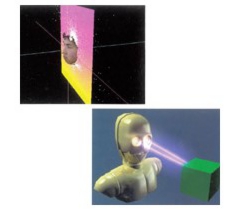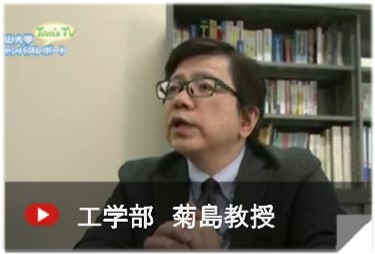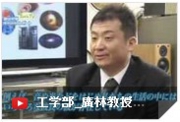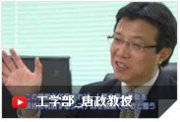Intellectual Information Engineering

Our life is dramatically changing with the rapid development of new technologies such as the internet, multimedia, computer graphics movies, and 3-D games. These fruitful technologies are the consequences of many years of the incessant efforts of information engineers and researchers. The Intellectual Information Engineering, Department of Engineering consists of three training division for raising information engineers and researchers who will lead the fields of the new technologies over the coming decades.
Intellectual Systems Engineering
This course focuses on the essential expertise of and research on system engineering, pattern recognition, knowledge information processing, algorithmic analysis, and computer simulations to develop intellectual information systems in the real world.
Prof. Shigeki Hirobayashi / Associate Prof. Tadanobu Misawa
Aiming to study new signal processing, and to explore its possibilities
and applications. Signals of interest include sound, images, economics,finance, cosmic ray, biological signals (for example, EEG, MRI, NIRS and OCT), and many others. Processing of such signals includes denoising,compression, visualization techniques, and brain-computer interface.
Medical Information Sensing
Prof. Hideyuki Hasegawa / Assoc. Prof. Mitsuru Sakai / Assistant Prof. Ryo Nagaoka
We aim to develop various sensing methods mainly using ultrasound, such as ultrasound signal detection, beamforming, image processing, spectrum analysis, pattern recognition, and motion estimation, for medical diagnosis and therapy. Such methods enable ultrafast ultrasound imaging and accurate functional imaging of biological tissues.
Biological Information Processing
Prof. Toshihide Tabata / Associate Prof. Mamoru Takamatsu
We study how biological systems including the brain work in order to provide the scaffolding for developing truly intelligent computers. We perform experimental research using cutting-edge techniques of electrophysiology, cellular imaging, behavior study, genetics, molecular biology, signal processing, etc. in collaboration with various institutes and firms inside and outside Japan. We also engage in information processing research widely from the foundation to applications of "vision", “light”, and "kansei engineering” and other issues strongly drawing attention in recent years.
Human Informatics
Prof. Takayuki Nozawa
We conduct education and research on the analysis and evaluation of human cognition and social interaction, and on the design of information technologies that support people's intellectual activities in real life. For this purpose, we use a combination of multimodal measurement of brain, psychological, physiological, and behavioral activities with data science and artificial intelligence techniques.
Media Information Engineering
This course focuses on the core theories of systems and applications that enable our modern multimedia-dependent life such as advanced telecommunication network, neuroinformatics, intelligent information processing, and coding and information security.
Information Communication Networks ![]()
Prof. Koji Kikushima / Lecturer Hiroshi Kakuhata
We conduct education and research on optical signal processing, transmission systems for the signals of emergency events such as earthquakes, modulation systems, transmission systems, optical communication systems, information communication networks, communication quality, and solitons.
Artificial Intelligence
Prof. Tang Zheng / Associate Prof. Gao Shangce
1) Research on intelligent information processing in general (neural networks /learning /models /applications)
2) Research on human interface technology
Quantum Information
Prof. Kiyoshi Tamaki / Lecture Tatsuto Murayama
We are working on quantum information where application of quantum mechanics offers revolutionary improvements to information processing. In particular, we are aiming at realizing quantum communication, such as quantum key distribution and quantum repeaters. We also apply Shannon's classical information theory to modern sensing and communications issues.





